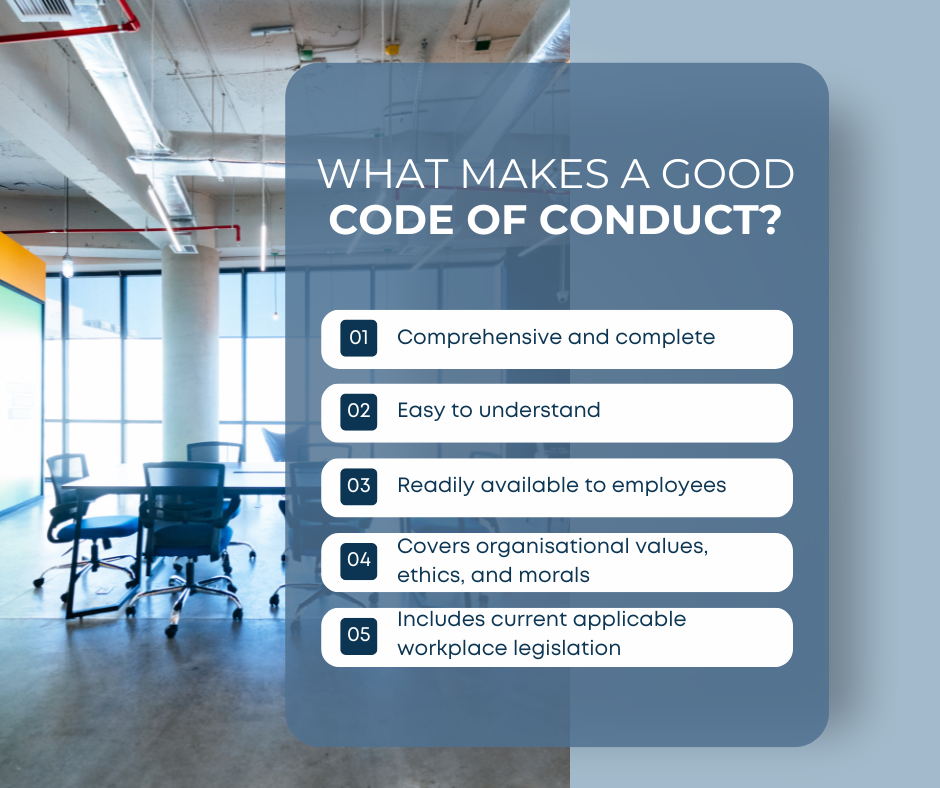Behavioural management and workplace culture play a significant role in in the health and safety of a business. There are many ways in which a company can build a positive health and safety culture in the workplace, but a good start is something every business should have – a Code of Conduct.
Why is a Code of Conduct important?
 A Code of Conduct (CoC) policy in the workplace provides employees with an outline of the company rules, values, and business vision.
A Code of Conduct (CoC) policy in the workplace provides employees with an outline of the company rules, values, and business vision.
Companies often use their CoC to communicate appropriate behaviour for the workplace to its employees via rules and expectations, and can be a great help when monitoring employee performance.
Employees must be able to understand a company’s rules to ensure they know what is expected of them when fulfilling their job role, and to show them what they should be working towards.
Writing these expectations in explicit terms within the company Code of Conduct, can act as guidance and sets the right standard for employees and their work.
If employees fully understand what is expected of them, this reduces the likelihood of any breaches of the Code of Conduct as employees understand what is meant by inappropriate behaviour within the workplace, and so avoid it.
Conflicts within the workplace are reduced with a comprehensive Code of Conduct as it details company values. Employees therefore are more respectful of each other as they understand that conflict in the workplace goes against company values and morals.
Building a successful health and safety culture
 A CoC can also outline certain safety behaviours required of employees to follow in line with HSE Guidance and Health and Safety legislation.
A CoC can also outline certain safety behaviours required of employees to follow in line with HSE Guidance and Health and Safety legislation.
Ensuring a positive health and safety culture can prove beneficial in reducing accident rates within businesses, creating a safer working environment.
A key part of building a positive health and safety culture is having a no blame culture. Being able to calmly discuss incidents and accidents and why they happened can help stop the accident from reoccurring.
By building effective communication channels, this will enable a successful health and safety culture within a company.
Companies with a positive workplace culture where employees treat each other as equals and follow the CoC find a higher workplace satisfaction rate among employees, which therefore boosts employee morale.
This can help companies attract and retain more employees and in the long term reduce costs and increase profits.
What makes a good Code of Conduct?
 A good Code of Conduct will include details regarding all the risks involved with works undertaken within the business.
A good Code of Conduct will include details regarding all the risks involved with works undertaken within the business.
The CoC should be comprehensive, easy to understand, and should be readily available for all employees to review as and when required.
The document should include details on the organisational values, ethics, and morals, which could be of interest to potential employees, customers, and other stakeholders.
A company CoC should include details about current applicable workplace legislation too.
These details, therefore, should be reviewed regularly and updated accordingly, with any updates clearly communicated to all employees ensuring that the CoC is still being followed appropriately.
Most importantly, having a good Code of Conduct helps to ensure and enable the health and safety of all employees within a workplace and acts as the main guidance for all employee’s behaviour whilst at work.
How can WA Management help?
WA Management offer a Code of Conduct online training course suitable for anyone in the workplace, and can help to protect both the business and an individual from misconduct.

Code of Conduct and Communication Skills training courses are essential tools in improving health and safety culture in the workplace. Make sure you don’t miss out on our 10% off deal on these courses, available until the end of April. Simply enter the code ‘management10’ at checkout to save!
Read more Consultant’s blogs here.
To keep up to date with the latest health & safety news and advice, follow us on social media:
